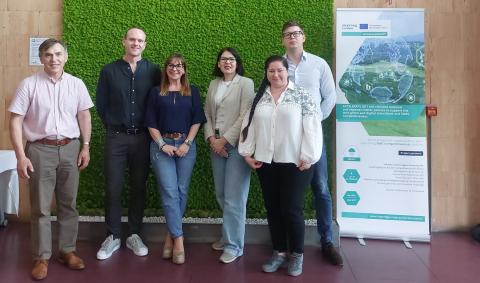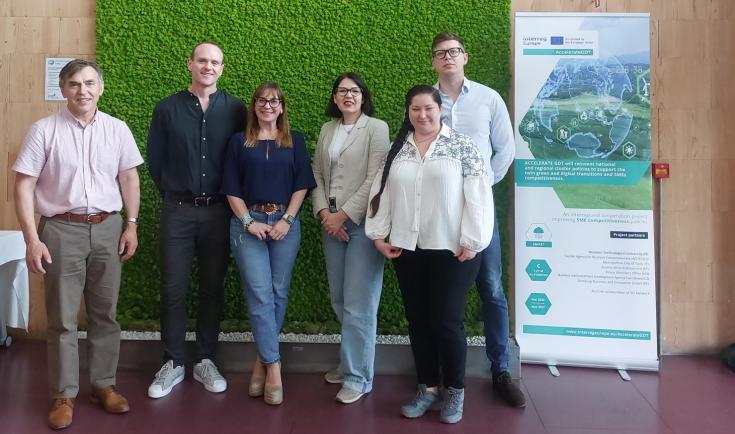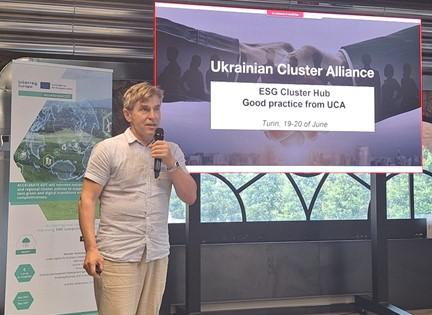Ukraine Joins Accelerate GDT
In 2024, the Interreg Europe programme expanded to seven new countries: Albania, Bosnia and Herzegovina, Moldova, Montenegro, North Macedonia, Serbia and Ukraine. The expansion created new cooperation opportunities for the Interreg community, with peers from new regions having the opportunity to join the exchanges of experiences.
As the first and second call projects of the 2021 to 2027 Interreg Europe programme were approved at a time when opportunities to work with the seven new countries did not yet exist, Interreg opened a restricted call for project proposals from March to June 2024 to extend their partnerships, 55 projects applied to the restricted call.
Accelerate GDT is delighted to announce that the Ukrainian Cluster Alliance (UCA), and the Ministry of Economy of Ukraine (MOE as Associate Policy partner) have been added to our consortium, and will work with our original 7 partners to realise the goals and aims of the ACCELERATE GDT project.
Alexandre Yurchak, Head of Ukrainian Cluster Alliance (UCA) is delighted to join the Accelerate GDT consortium he believes “Updating of Ukraine's national cluster policy and aligning it with other enterprise policies including industrial, innovation and twin transition is crucial and strategic for cluster development over the past 4 years. Accelerate GDT is adding to our good relationship with Ministry of economy of Ukraine developed over many years, and is the missing element, to relaunch all these processes of align cluster policy with our National Economic Strategy until 2030. UCA really appreciate the invitation to Accelerate GDT and we’ll be happy to establish new collaborations with project’s partners, and sharing benefits and knowledge with all parties.”

The Ukrainian Cluster Alliance is the union of Ukrainian clusters with the strong focus on Industrial and high-tech clusters. The war in Ukraine has brought together Ukrainian clusters and SMEs via the Ukrainian Cluster Alliance (UCA).
The UCA has the mission to develop cluster movement in Ukraine in line with principles of cluster policies of European Union and in collaboration with European clusters. To provide quality services to its members, Ukrainian Cluster Alliance develops coordinated activities at the national level which cover all main Ukrainian industries, and which strongly oriented to internationalization of Ukrainian clusters. Ukrainian Cluster Alliance has the structure that aim to support and promote among cluster the initiatives of smart specialization, better integration into European values chains, innovations, digital and green transition.
Accelerate GDT recognises that across Europe clusters are a key tool for economic and regional development. They provide a reliable bridge to connect the industry, academia and government. In Ukraine the UCA and MoE are committed to the creation of a regulatory framework to help cluster organisations to be recognised as official economic entities that can help the government to understand and identify the actual needs of business more quickly and consistently, and vice versa – to help businesses to engage in a more active and coordinated dialogue with government representatives.
UCA and MoE will influence the National Economic Strategy until 2030 (NES-2030) which is responsible for concrete initiatives designed to ensure economic growth and to increase the welfare of Ukrainians. The National Economic Strategy notably aims to ensure the appropriate level of welfare, self-realisation, security, rights and freedoms of every citizen of Ukraine through innovative economic growth. It sets a net zero goal to 2060. Integration of clustering into the NES-2030 will support impact through collaboration, innovation, research, internationalisation and the green and digital transition.
Claudia Soncin, Network Co-ordinator TCI and Accelerate GDT project manager was integral to bringing UCA into the Accelerate GDT project, explaining “after the start of the war, UCA joining the TCI network to connect their constituent clusters globally and develop their value chains. When the Interreg Europe extension call was published, we saw a great opportunity for UCA to connect with the Accelerate GDT project to realise its goals of developing a programme of supports for clusters across the Ukraine, and supporting clusters to meet the twin transition.”

Dr Hobbs believes “the key benefit of the Accelerate GDT project is the ability to collaborate with our international partners, meet them face to face during the project and learn from their experiences and let them benefit through ours – that is how real learning occurs. We are indebted to Interreg Europe and excited to extend this partnership to work with UCA and MoE. Having UCA and MoE in Turin with us at our 3rd Workshop and Study Visit was very informative and we are really looking forward to co-learning with them within Accelerate GDT and developing strong connections and policies.”

